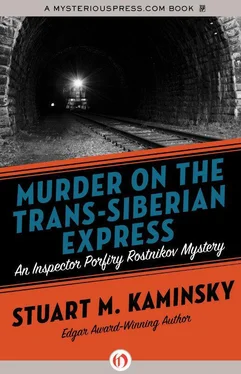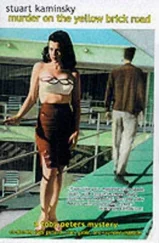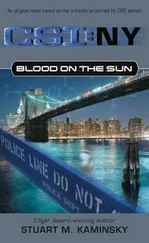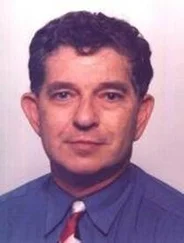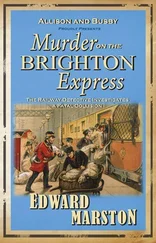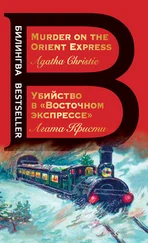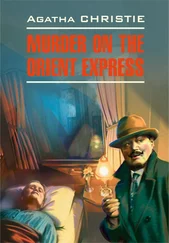Stuart Kaminsky - Murder on the Trans-Siberian Express
Здесь есть возможность читать онлайн «Stuart Kaminsky - Murder on the Trans-Siberian Express» весь текст электронной книги совершенно бесплатно (целиком полную версию без сокращений). В некоторых случаях можно слушать аудио, скачать через торрент в формате fb2 и присутствует краткое содержание. Год выпуска: 2012, Жанр: Полицейский детектив, на английском языке. Описание произведения, (предисловие) а так же отзывы посетителей доступны на портале библиотеки ЛибКат.
- Название:Murder on the Trans-Siberian Express
- Автор:
- Жанр:
- Год:2012
- ISBN:нет данных
- Рейтинг книги:3 / 5. Голосов: 1
-
Избранное:Добавить в избранное
- Отзывы:
-
Ваша оценка:
- 60
- 1
- 2
- 3
- 4
- 5
Murder on the Trans-Siberian Express: краткое содержание, описание и аннотация
Предлагаем к чтению аннотацию, описание, краткое содержание или предисловие (зависит от того, что написал сам автор книги «Murder on the Trans-Siberian Express»). Если вы не нашли необходимую информацию о книге — напишите в комментариях, мы постараемся отыскать её.
Murder on the Trans-Siberian Express — читать онлайн бесплатно полную книгу (весь текст) целиком
Ниже представлен текст книги, разбитый по страницам. Система сохранения места последней прочитанной страницы, позволяет с удобством читать онлайн бесплатно книгу «Murder on the Trans-Siberian Express», без необходимости каждый раз заново искать на чём Вы остановились. Поставьте закладку, и сможете в любой момент перейти на страницу, на которой закончили чтение.
Интервал:
Закладка:
“The bread,” he said. “You didn’t slice it. How can we make sandwiches if … oh, yes. Your wrist. I’ll slice it. Hand me the knife.”
“I’ll get the bread knife,” she said, starting to rise.
“That one will do,” he said, holding out his hand.
She could not give it to him. He could not have it. It was her instrument, something like a religious icon, something he could not touch.
“Well, give me the knife,” he said with irritation she well recognized. His daughter was a lunatic. Inna was slow. Inna was a chain around his neck. Inna was a servant.
She swept her hand toward the knife and sent it spinning off the table toward the refrigerator.
“Inna,” her father said in exasperation.
“I am sorry,” she said, rising quickly. “I will clean it.”
She reached for the knife and took two steps to put it in the sink. Then she opened the drawer and pulled out the brown-handled serrated bread knife. She kept it sharp. She kept them all sharp but none as sharp as the one she had placed in the sink. It would need special work in the morning when her father had left. It might have nicks from its flight across the room, a smudge on the handle. She didn’t see anything immediately.
“Here,” she said, handing him the bread knife.
“Why don’t you go to bed early?” he asked. “After you clean up and do the dishes.”
Inna knew it was more than a suggestion.
“Yes,” she said.
“Take a pain pill and your regular pills and go to sleep. I will work in here.”
“Yes.”
“Eat something,” Viktor said, picking up a handful of red sausage slices with a fork and depositing them on her plate.
He watched her pick up a piece of sausage with her fingers and put it to her mouth, taking a small bite.
“Use your fork,” he said.
She nodded and picked up the fork. He went back to his report.
“I am reading a book,” she said.
“Good.”
“It is about the metro system,” she said.
“Good,” he repeated, giving her a small false smile followed by a look that made it clear he wanted to hear no more about the metro and sore wrists.
It was always like this. Sometimes her father talked about business, the government, about a plan he had made to save or earn money for his company. She was expected to nod and be attentive. She was not expected to understand.
There were many good things about her father. He had never struck her. He had never punished her. He had provided her with food and a home and enough clothing. He had never shouted at Inna or called her names. He had simply made it clear that she was a burden to be tolerated and not listened to, if he could avoid doing so.
And that was, as she remembered, how he had treated her mother. Inna was just the continuation of her mother. She wondered how he might react if she told him what she had done and planned to continue doing. Would he scream, hit her, pull her hair? It might well be worth telling him if she thought he might really do something other than make a phone call, have her taken away, and go back to reading his reports.
Inna waited till she was sure her father was finished with his dinner and then, using only her left hand, she slowly cleared the table while he drank coffee and made notes.
“What is the book?” asked Nina, standing next to the bed where Porfiry Petrovich was packing his suitcase.
Nina was eight years old and for the first two months she and her twelve-year-old sister, Laura, had lived with the Rostnikovs she had said nothing. Now, still very serious and thin, she was explosive with questions about everything.
“It is a book about policemen,” Rostnikov said.
The girl shook her head knowingly, her hands clasped behind her back, her body twisting slowly from side to side.
“Russian policemen?” she asked. “Like you?”
“American policemen,” he said. “In a place called Isola.”
He finished filling his bag, looked down, and removed the Ed McBain paperback novel Jigsaw and placed it in his pocket. It was badly dog-eared. He had read it three times over the past decade and looked forward to returning to it. He closed the suitcase.
“You are ready?” Nina asked.
“I am ready,” he said, straightening up and looking at her.
“My grandmother says you are going to Siberia,” she said. “What did you do wrong?”
“Many things,” he said. “Many things. But I am going to find a criminal. I will be back in a few days. I’m going on the Trans-Siberian Express.”
“What is that?”
“The greatest train in the world,” he said, sitting on the edge of the bed. “Almost six thousand miles long, the longest continuous railroad in the world. They began building it from Moscow and from Vladivostok in Siberia on the Sea of Japan in 1891.”
“Two places?”
“They met at a bridge in Khabarovsk in 1916. I’ll show you on the map. It is one of the world’s greatest accomplishments, one of Russia’s greatest triumphs. Thousands of miles of track had to be built and rebuilt. It cost more than a trillion rubles.”
“How much is that?”
“If you take rubles and piled them on top of each other, a trillion would reach almost to the space station.”
“The space station is as high as a star,” the girl said in awe.
“Not that high, but high enough. The train goes over hundreds of bridges and through almost a hundred tunnels, traveling at one hundred and twelve miles an hour between stops.”
“You’ve been on it’ many times,” she said.
“Never before,” answered Rostnikov, trying to think if he had forgotten something.
“Can I go with you?”
“Perhaps another time,” he said. “Perhaps when you are grown you can go with your husband.”
“I am not married,” she said seriously.
“Perhaps you will be,” he said, satisfied that he could think of nothing further to pack. “Let us go in with the others.”
“I am not going to get married,” the girl said. “I am going to be a foot doctor.”
“A noble ambition,” he said, taking her hand. “You can be my foot doctor.”
“I’ll only charge you half,” she said. “Because you have only one foot.”
“Most generous and fair. Maybe your sister will become an engineer and she can work on my other foot.”
“She wants to be a plumber,” Nina said as they moved through the bedroom door into the living room-dining room area. “Like you.
“An equally noble ambition,” said Rostnikov.
Sarah, Galina, and Laura were seated at the table. The adults had said nothing to the children about the meeting with their mother.
Sarah Rostnikov was talking about a concert they would be going to while he was gone. They had an extra ticket. Sarah’s cousin, Leon the doctor, was appearing with his quartet. Leon played piano, had a particular passion for Mozart, and made lots of money in his practice catering to those who could afford his services and held the widespread and almost mystical belief that Jewish doctors were far better than those who were not. Rostnikov was not a fan of classical music though he went dutifully to such concerts and found that he could lose himself in a dreamy, open-eyed meditation almost approaching the near-nirvana he felt when he lost himself in the pragmatic magic of a plumbing problem.
Sarah looked up at him and smiled. He nodded to show that he was packed. Sarah was still a beauty. Her natural and shiny red hair had grown out following her surgery and she had regained some but far from all of her former plumpness. Her pale smooth skin was a bit more pale than he thought looked healthy, but she’d survived. Except for the frequent headaches, Sarah had recovered enough to go back to work at the Dom music shop on a half-time basis.
Читать дальшеИнтервал:
Закладка:
Похожие книги на «Murder on the Trans-Siberian Express»
Представляем Вашему вниманию похожие книги на «Murder on the Trans-Siberian Express» списком для выбора. Мы отобрали схожую по названию и смыслу литературу в надежде предоставить читателям больше вариантов отыскать новые, интересные, ещё непрочитанные произведения.
Обсуждение, отзывы о книге «Murder on the Trans-Siberian Express» и просто собственные мнения читателей. Оставьте ваши комментарии, напишите, что Вы думаете о произведении, его смысле или главных героях. Укажите что конкретно понравилось, а что нет, и почему Вы так считаете.
